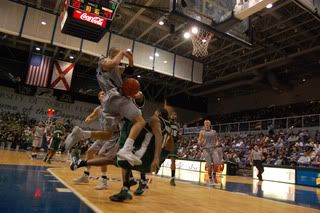
UNF Athletic Director Lee Moon and his predecessors have emphasized the importance of UNF athletes’ ability to excel both in the classroom and in competition.
“It’s the tradition of the university to have high academic standards,” Moon said.
He said it is up to the athletic department to find athletes who want that quality education.
“Our athletic admission’s standards by the previous policy were tougher than Duke University,” President John Delaney said.
Will Dixon, Duke’s senior admissions officer, said there are no fixed GPA or testing requirements for a prospective athletic student looking at Duke. The student merely has to contact the athletic department and relay an interest in becoming a Blue Devil.
They look at the student’s economic background, public services and any high
achviements in high school performances.
“It’s not a numbers game; we make our admissions process easy,” Dixon said.
What Moon believes is different about this year, is that in the past, no one really had a plan for running a Division I program.
That is why Moon says he was brought to UNF, because he has plenty of experience in getting Division I programs off the ground.
Before Moon arrived at UNF, there were 12 admissions exceptions annually across the board for athletes who fell below the level of normal criteria for fall admission, Moon said.
He does not even know if all the exceptions were used, but knows not all the sports used them.
There was also no money set aside for athletes to be admitted into a summer school program although it was still a possibility. However, Moon believes that by reevaluating the previous systems and making small adjustments, UNF will be able to draw in more high profile recruits.
UNF’s athletics department has a new process by which they evaluate each prospective athlete through different criteria and see how they would fit into the UNF program.
Moon reviews every candidate that the coaches submit. And instead of the Athletics department bound by 12 exceptions, Moon can now bring in an unlimited number of athletic exceptions.
There is a form they apply to each student that classifies them on different criteria including SAT, GPA and character.
After the form is filled out, each student is classified by what level of risk.
Moon said they have used color systems and number systems to classify the athletes’ risk.
The color system is: green, for all clear; yellow, for caution; and red, for high risk.
The number system goes from one to five, with five being a low risk and one being a high risk.
The whole process is designed to weigh how much of a benefit to the university the athlete would be against how much risk the university would be taking on them.
After classification, Moon makes his recommendation on whether or not an athlete should be offered a scholarship to John Yancey, UNF’s admissions director.
If Yancey says no to a candidate, they can still be accepted for the fall term by approval through an appeals committee.
According to the UNF catalog, an average student needs a recalculated grade point average of 3.0 in order to be accepted into UNF.
But there is another option for students who do not meet the established criteria,
called the summer Academic Potential Program.
Those students who do not meet the university admission requirements for fall may be admitted to summer B classes. If they achieve a C or better in those classes, they can continue on at UNF in the fall.
The benefit
Thanks to the shifting of funds the money is now there for UNF Athletics to provide prospective athletes with the opportunity to enter summer classes.
Allowing student athletes to be admitted during the summer session is a good plan, Moon said, especially because of the high levels of support the athletic department is providing for their teams.
“We aren’t taking anybody who wouldn’t normally be able to get into the school,” Moon said. But we are bringing in athletes who meet the summer school requirements.”
The coaches also play a pivotal part in the athletes’ academics, Moon said.
They have to understand and be committed to making sure the students get the support they need to achieve good grades and attend all their classes and necessary tutoring sessions.
“We make sure we take care of our kids and give them the right support,” Moon said.
“If we have somebody that is not as good a student as others then we know what we have to do to help them. We are not going to just throw them to the wolves.”
E-mail Heather Furey
atasst.sports@unfspinnaker.com.











